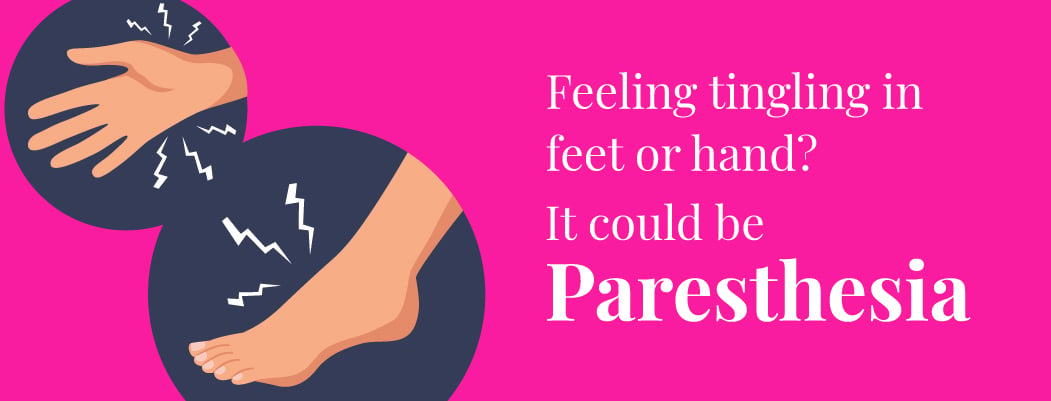What is paresthesia? Causes, Symptoms and Treatment
December 20, 2022

You may have had paresthesia if you’ve ever had the sensation that your skin is crawling or if itching or numbness occurs for no apparent reason.
Paresthesia has almost certainly happened to everyone at some point. When their arms or legs “fall asleep,” people frequently experience that familiar pins-and-needles sensation. This sensation typically happens as a result of unintentionally pressing against a nerve. Once you move to relieve pressure on the afflicted nerve, the problem goes away. This kind of paresthesia is temporary and typically goes away on its own. If the paresthesia doesn’t go away, you might have a condition that needs to be treated at the medical level.
What are the signs of paresthesia?
Any area of the body can have paresthesia, although it most frequently affects the:
- Hands
- Arms
- Legs
- Feet
It could be short-lived or persistent. Feelings like these can be among the symptoms:
- Numbness
- Weakness
- Tingling
- Burning
- Cold
Having chronic paresthesia might hurt like a stabbing. This could cause the affected limb to become clumsy. In addition, it might be challenging to walk when paresthesia affects your legs and feet.
If your paresthesia symptoms worsen or have an impact on your quality of life, consult a doctor. It can indicate that you have a medical ailment that needs to be treated on the inside.
Causes of Paresthesia
Pressure on a nerve is the cause of the paresthesia. The feeling disappears once the pressure is relieved, such as when your legs are uncrossed.
However, in other instances, it persists. Or, if it does, it returns frequently. That is referred to as ” chronic paresthesia,” which may indicate a disease or nerve injury. Chronic paresthesia can result from a number of factors, including:
- An incident or injury that damaged the nerves
- A stroke or mini-stroke occurs when your brain’s blood supply is interrupted and damaged it.
- Neuropathy: injury to the nerves
- A pinched nerve is caused by an injury or excessive use, typically in the neck, shoulder, or arm.
Who gets paresthesia?
Some things make having a pinched nerve more likely:
- Women are more likely to develop carpal tunnel syndrome than men, presumably due to a smaller nerve canal.
- Obesity: Carrying too much weight might strain the nerves.
- Pregnancy: Weight increase and water retention brought on by pregnancy can enlarge tissues and put a strain on nerves.
- Thyroid disease: This increases the possibility of developing carpal tunnel syndrome.
- Diabetes: Diabetic patients may experience nerve and tissue damage.
- Inflammation brought on by rheumatoid arthritis may also induce nerve compression in the joints.
- Long-term lying down in bed: Long-term lying down increases the risk of paresthesia and can compress the nerves.
Diagnosis for paresthesia
A doctor will first obtain a patient’s medical history and inquire about their symptoms to diagnose paresthesis.
After that, the doctor will probably do a physical examination, depending on the results.
- The study of nerve conduction assesses the speed at which nerve impulses go through the muscles.
- Examining the electrical activity of how nerves and muscles interact through electromyography (EMG).
- Using magnetic resonance imaging (MRI), one may examine the various parts of the body in great detail.
- Ultrasound: This imaging technique, which creates images of the body, can be used on smaller areas to check for nerve injury or compression, such as that seen in carpal tunnel syndrome.
How can paresthesia be prevented?
Paresthesia is sometimes impossible to avoid. For instance, if you frequently fall asleep in your arms, you probably can’t stop it. However, there are things you can take to lessen paresthesia’s frequency or intensity. For instance, wrist splints at night may reduce compression on your hand’s nerves and help with paresthesia symptoms.
To avoid developing chronic paresthesia, remember to:
- If at all possible, avoid repetitive movement.
- If you have to do repetitive motions, take frequent breaks.
- If you have to sit for an extended time, get up and move around as often as you can.
- Careful monitoring and illness treatment if you have diabetes or any other chronic disease will reduce your risk of becoming paresthesia.
When to seek medical help?
Any strange feelings that persist for more than a few minutes or come back should be discussed with your doctor because paresthesia might indicate a disease, problem, or condition.
Seek immediate medical assistance in an emergency centre if you develop paresthetic symptoms while doing any of the following:
- A lack of bowel or bladder control
- Paralysis
- Confusion
- The extremities are weakened
- Slurred speech
Which doctor should I consult for Paresthesia?
A neurologist should be consulted for the treatment of paresthesia.
Summary
The medical name for a sensation of tingling and numbness across the body is paresthesia. Some people describe it as having pins and needles.
Many people occasionally experience paresthesia, which is frequently brought on by spending a lot of time in one place, like while sitting or riding a bike. Seek medical attention, however, if you discover that the tingling is prolonged or feels intense or unsettling in any way.
The underlying cause of paresthesia will determine how it is treated. Both orthopaedic and neurological reasons may be to blame.
The medical name for a sensation of tingling and numbness across the body is paresthesia. Some people describe it as having pins and needles.
Many people occasionally experience paresthesia, which is frequently brought on by spending a lot of time in one place, like sitting or riding a bike. Seek medical attention, however, if you discover that the tingling is prolonged or feels intense or unsettling in any way.
The underlying cause of paresthesia will determine how it is treated. Both orthopaedic and neurological reasons may be to blame.
People also ask
1. When is paresthesia serious?
Paresthesia frequently disappears on its own. However, consult your doctor if any part of your body experiences “pins and needles” or numbness on a regular basis. They will do a physical assessment and inquire about your medical history. Additionally, they might suggest specific tests to identify the cause of your paresthesia.
2. How do you get rid of paresthesia?
You might be able to stop any tingling or numbness you’re feeling by moving to reduce pressure on the nerve.
3. What is the difference between numbness and paresthesia?
Paraesthesia is the term for abnormal feelings, including prickling, tingling, itching, burning, chilling, skin crawling, or impaired sensations. These signs are typically the result of nerve injury (neuropathy). Continued nerve injury may result in paralysis or numbness (loss of sensation) (loss of movement and sensation).
4. Which nerve is commonly associated with paresthesia?
Your leg or foot may have paresthesia if you have lumbar radiculopathy. Compression of the sciatic nerve can happen in more serious situations, which can cause weakness in your legs. A sizable nerve that originates in your lower spinal cord is called the sciatic nerve.








